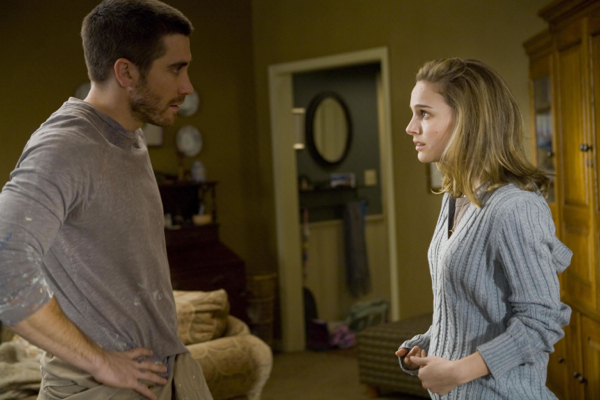Movie review by Greg Carlson
A remake of the 2004 Danish film directed by Susanne Bier, “Brothers” adds nothing new to the tradition of the returning-from-war subgenre, even as veteran filmmaker Jim Sheridan’s steady hand guides an attractive and talented cast. Three of Hollywood’s most promising young leads, Natalie Portman, Tobey Maguire, and Jake Gyllenhaal, are not entirely convincing as representatives of the working class, but the stars do their best with a script that depends too heavily on doses of mountainous inevitability and dubious implausibility.
Maguire plays Marine Captain Sam Cahill, a veteran soldier who has seen men through several tours of duty in Afghanistan. Sam dotes on his two adorable daughters and lavishes affection on wife Grace (Portman), his sweetheart since high school. As Sam prepares to deploy, his troubled brother Tommy gets out of prison, and the extended Cahill family copes uneasily with the changes. Shortly after Tommy’s return, Sam is believed killed in action, and Grace turns to her brother-in-law for comfort and support. In love triangle movies, sport can be made of imagining the actors trading roles, and it is hard not to think that “Brothers” might have been more interesting had Maguire and Gyllenhaal switched parts.
It has been suggested that mainstream studio-released films addressing Operation Enduring Freedom carefully avoid taking any political position, but haven’t war movies always balanced on the edge of cheering tremendous personal sacrifice while ruing the horrors that inevitably scar the brave protagonists? Movies dealing with the cruelty of combat appeal to the voyeur who craves images of inherently dramatic mayhem and yet laments the tragedy of killing. Sam pays a horrific price that erases his ability to readjust to domestic routine, but the template of “Brothers” is familiar enough that the viewer can anticipate nearly every scene.
Post Traumatic Stress Disorder propels the second half conflict of “Brothers,” in which Sam returns to pick up the pieces of his shattered life, but the film’s presentation of the debilitating impairment doesn’t hold a candle to “Taxi Driver” or “Coming Home.” The story demands that Sam be presumed dead long enough for Tommy and Grace to develop a relationship, but that very requirement challenges the audience to sympathize with the absent Marine, whose own children verbalize their desire for Mommy to partner with Uncle Tommy. As Sheridan cuts between Sam’s ordeal in Afghanistan and Grace and Tommy growing closer, a tone of anxiety and unease clouds the narrative.
The deficiencies of “Brothers” include oversimplified and underwritten roles for the leads (Portman’s part in particular is egregiously neglected by screenwriter David Benioff), and a few farfetched plot complications. Sam Shepard, who plays the alcoholic father of Sam and Tommy, praises his straight arrow offspring but makes no effort to hide his contempt for the one who spent time behind bars. His hot and cold emotional shifts, represented as polar extremes, apply to many of the movie’s other relationships. The Muslim bad guys are equally as flat, standing in as terror merchants whose lack of humanity feels contrived and convenient. More disappointing, the principal characters in “Brothers” receive the same treatment, ending up as symbolic representations of dutiful wife, damaged soldier, and repentant lawbreaker instead of recognizable individuals.
